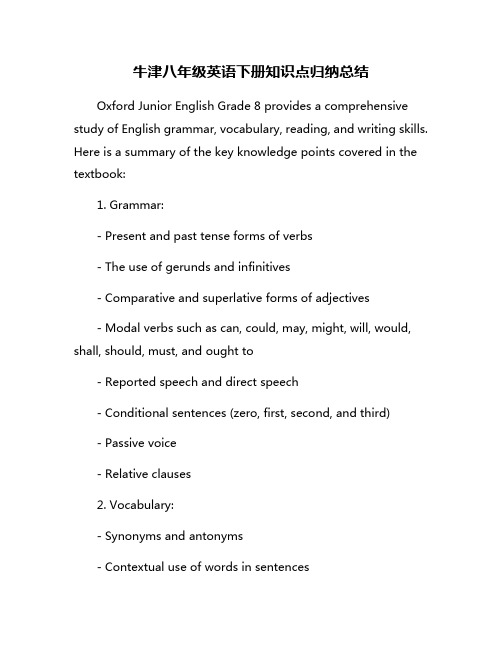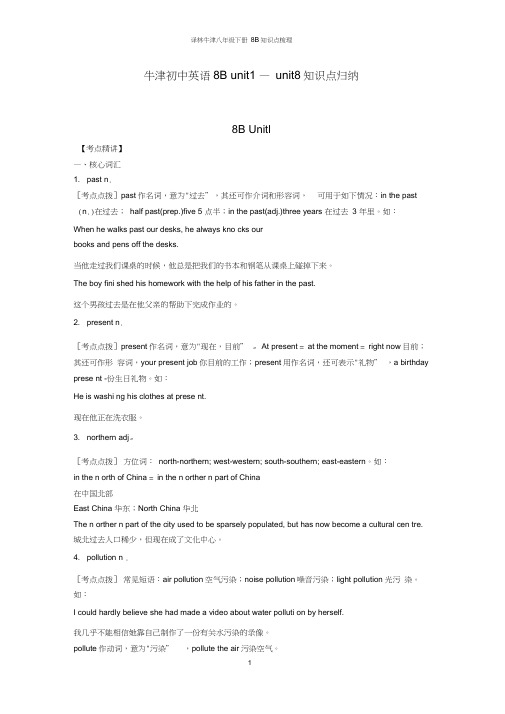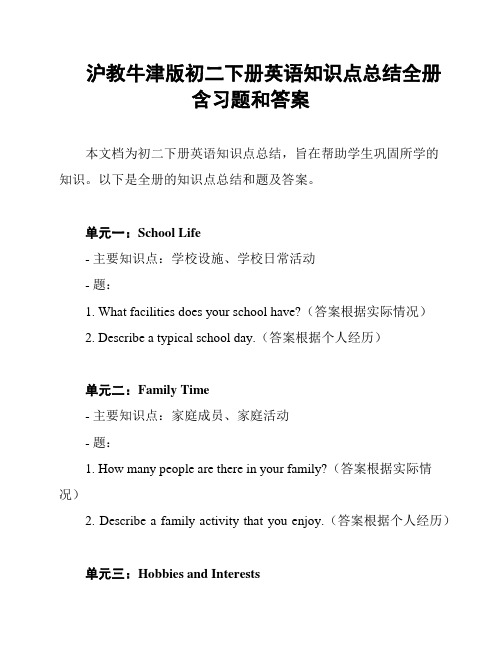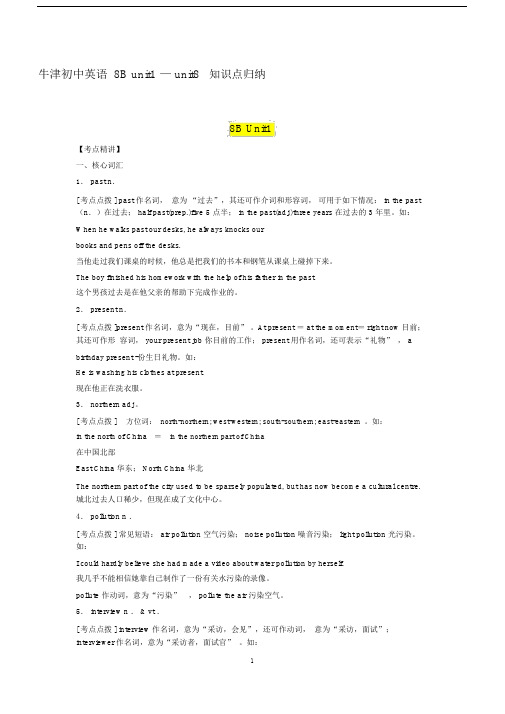牛津英语八年级下册知识点梳理
牛津译林版八年级英语下册全册词汇、句型、语法知识点及训练汇总

牛津译林版八年级英语下册Unit 1 Past and present词汇、句型、语法知识点及训练知识精讲一、必背词汇past n. 过去adj.过去的present n. 现在,目前just adv. 刚才since conj. 自……以来prep.自……以来ever adv. 曾经northern adj. 北方,北部的married adj. 已婚的,结婚的wife n.(pl. wives) 妻子block n.街区over prep. 在……期间pollution n. 污染;污染物factory n. 工厂waste n. 废料;废品realize (= realise )vt.& vi.意识到;实现improve vt.&vi. 改进,改善situation n. 形势,情况impossible adj. 不可能的before adv.以前,过去lonely adj. 孤独的,寂寞的anyway adv. 尽管,即使这样husband n. 丈夫interview n. 采访;会见yet adv. 还,仍recently adv.近来,最近environment n. 环境transport n.交通车辆,运输工具condition n. 环境,条件,状况return vi. 返回last adv.最近,上一次;最后abroad adv. 到(在)国外primary adj. 小学教育的;初级的communicate vt. &vi. 交流,交际exactly adv.(答语)正是,没错narrow adj. 狭窄的二、重点词汇1. present noun /ˈprez.ənt/1). something that you are given, without asking for it, on a special occasion, especially to showfriendship, or to say thank you(尤指表示友谊或致谢的)礼物,赠品例句:They gave me theatre tickets as a present.他们送给我戏票作为礼物。
牛津八年级英语下册知识点归纳总结

牛津八年级英语下册知识点归纳总结Oxford Junior English Grade 8 provides a comprehensive study of English grammar, vocabulary, reading, and writing skills. Here is a summary of the key knowledge points covered in the textbook:1. Grammar:- Present and past tense forms of verbs- The use of gerunds and infinitives- Comparative and superlative forms of adjectives- Modal verbs such as can, could, may, might, will, would, shall, should, must, and ought to- Reported speech and direct speech- Conditional sentences (zero, first, second, and third)- Passive voice- Relative clauses2. Vocabulary:- Synonyms and antonyms- Contextual use of words in sentences- Phrasal verbs- Idioms and expressions- Prefixes and suffixes- Homophones and homographs- Word formation (nouns, verbs, adjectives, adverbs)3. Reading:- Comprehension passages with different text types (narrative, descriptive, expository, persuasive)- Identifying main ideas and supporting details- Inference and predicting outcomes- Summarizing texts- Recognizing literary devices (simile, metaphor, personification, alliteration, onomatopoeia)4. Writing:- Paragraph and essay writing- Narrative, descriptive, and argumentative writing- Using appropriate linking words and phrases- Organizing ideas cohesively- Structure of a formal letter and email- Creative writing techniquesOverall, the Oxford Junior English Grade 8 textbook offers a well-rounded English language curriculum that helps students improve their language skills in grammar, vocabulary, reading, and writing. By mastering these knowledge points, students can better communicate and express themselves effectively in English.。
牛津英语八年级下册知识点梳理

八年级下册知识点Unit1 一【精选词汇】【精选词汇】㈠重点短语㈠重点短语1. the changes to Sunshine Town 阳光镇的变化→the changes to … …的变化的变化 (p8)〈知识链接〉change n.变化,常用复数变化,常用复数changes 。
e.g. Great changes have taken place since 1995.2. in the southern part of town →in the southern part of …在…的南部→south →southern〈知识链接〉east 东部→eastern 东部的, west →western, north →northern 3. in the past 在过去→at present 现在→in the future 未来;将来,注意这些短语中的介词和冠词。
未来;将来,注意这些短语中的介词和冠词。
4. turn the place into a park →turn …into …把…变成…〈知识链接〉①Heat turns water into vapor.热使水变成蒸气。
②Turn this sentence into English.5. play cards and Chinese chess 打牌、下象棋,e.g. It ’s pleasant to play cards and Chinese chess.6. water pollution 水污染→air pollution 空气污染,noise pollution 噪音污染噪音污染 (p9)〈知识链接〉Water pollution was a problem before. 7. used to dump its waste into water →used to do sth 过去常做某事,注意否定式、疑问式的形式过去常做某事,注意否定式、疑问式的形式过去常做某事,注意否定式、疑问式的形式 〈知识链接〉⑴used to do sth →否定式used not to do sth 或didn ’t use to do sth→疑问式Did sb use to do sth?或Used sb to do sth? ⑵There be 和used to 合用的形式为There used to be 。
牛津译林版英语八年级下册笔记整理(考点1-40) PDF

8B 笔记整理(考点1 ~ 40)1. 现在完成时的信号词:2. 现在完成时的基本结构:肯定句:主语+ have / has + 过去分词否定句:主语+ have / has + not + 过去分词一般疑问句:Have / Has + 主语+ 过去分词3. used to do sth. 过去常常做某事;used to be 过去曾是…be used to doing sth. / get used to doing sth. 习惯做某事注意:观察used 前面有没有be 动词或者get / got4. Asia 亚洲Asian 亚洲的/ 亚洲人Europe 欧洲European 欧洲的/ 欧洲人Africa 非洲African 非洲的/ 欧洲人America 美洲American 美洲的/ 欧洲人* a European country 虽然元音字母开头,但是发音为辅音,所以用a* Americans and Europeans 美洲人和欧洲人; Asians and Africans 亚洲人和非洲人5. Canada 加拿大Canadian 加拿大的/ 加拿大人;Australia 澳大利亚Australian 澳大利亚的/ 澳大利亚人;Germany 德国German 德语/ 德国人的/ 德国人France 法国Fr e nc h 法语/ 法国人的/ 法国人注意:名词所有格Canadian s’ books 那些加拿大人的书the Canadian’s book 那个加拿大人的书6. ①mind doing sth.介意做某事Do you mind my opening the window? / Do you mind me opening the window?②Never mind. (口语交际)没关系,不介意③ A moment of fear went through my mind. 【名词】头脑,大脑7. 句型The best time to do sth.The best time to visit the UK is … / from … to …Sunshine Park is a wonderful place to fly kites.* 与time / place 相关的句型(表示最佳时间、最佳地点)使用to do 结构;* 短语have a good time doing sth. 使用doing 结构8. east 东方east ern东方的;west 西方west ern西方的;south 南方south ern南方的;north 北方north ern北方的;at the southern end of …在…的最南端;Western restaurants 西餐馆(表示西方文化、艺术的时候需要大写)9. can’t help / stop doing sth. 情不自禁做某事/ 忍不住做某事stop doing sth. 停止正在做的事;stop to do sth. 停下手中的事去做一件新事情10. to do 不定式表示目的(理解句意,在翻译句子的基础上理解目的的表达)We must try our best to stop the pollution to live (live) a happy life. 为了…11. be interested in doing sth. She is interested in reading novels. 对…感兴趣show an interest in doing sth. She shows an interest in reading novels.interested (感到)有兴趣的interesting 令人感兴趣的bored (感到)无聊的boring 令人感到无聊的excited (感到)兴奋的exciting 令人感到兴奋的relaxed (感到)放松的relaxing 令人放松的12. 序数词第…in the early / late twentieth century 在(第)二十世纪早/晚期区分:in the / one’s thirties 名词复数形式意思是30~39之间She is in his thirties.thirtieth 序数词意思是第三十celebrate her thirtieth birthday基数词变序数词14. hear / see sb. do sth. 听见/看见某人做事的全过程hear / see sb. doing sth. 听见/看见某人做事的一瞬间注意:经常听见或看见的是全过程I often hear the birds sing.比较级的基本结构:比较级+ than最高级的基本结构:the + 最高级16. 区分:形容词的比较级和形容词变副词* I find it easier than before to complete the task.* Susan can work out the problem easily. 轻松地解决难题副词修饰动词* 修饰比较级much / even / a little + 比较级+ than* 注意:further information / study / help …(程度)更进一步的;Further on …再往前区分:tasty = delicious 美味的;tasteful 有品味的;雅致的18. 反义词前缀un-, in-, im- 意思是not注意:读懂句意,准确判断词性,在理解句子意思的基础上补充词缀。
译林牛津八年级下册8B知识点梳理

牛津初中英语8B unit1 —unit8知识点归纳8B Unitl【考点精讲】—、核心词汇1. past n.[考点点拨]past作名词,意为"过去”,其还可作介词和形容词,可用于如下情况:in the past (n.)在过去;half past(prep.)five 5 点半;in the past(adj.)three years 在过去 3 年里。
如:When he walks past our desks, he always kno cks ourbooks and pens off the desks.当他走过我们课桌的时候,他总是把我们的书本和钢笔从课桌上碰掉下来。
The boy fini shed his homework with the help of his father in the past.这个男孩过去是在他父亲的帮助下完成作业的。
2. present n.[考点点拨]present作名词,意为"现在,目前” 。
At present = at the moment = right now目前;其还可作形容词,your present job你目前的工作;present用作名词,还可表示"礼物” ,a birthday prese nt -份生日礼物。
如:He is washi ng his clothes at prese nt.现在他正在洗衣服。
3. northern adj。
[考点点拨]方位词:north-northern; west-western; south-southern; east-eastern。
如:in the n orth of China = in the n orther n part of China在中国北部East China 华东;North China 华北The n orther n part of the city used to be sparsely populated, but has now become a cultural cen tre. 城北过去人口稀少,但现在成了文化中心。
沪教牛津版初二下册英语知识点总结全册含习题和答案

沪教牛津版初二下册英语知识点总结全册含习题和答案本文档为初二下册英语知识点总结,旨在帮助学生巩固所学的知识。
以下是全册的知识点总结和题及答案。
单元一:School Life- 主要知识点:学校设施、学校日常活动- 题:1. What facilities does your school have?(答案根据实际情况)2. Describe a typical school day.(答案根据个人经历)单元二:Family Time- 主要知识点:家庭成员、家庭活动- 题:1. How many people are there in your family?(答案根据实际情况)2. Describe a family activity that you enjoy.(答案根据个人经历)单元三:Hobbies and Interests- 主要知识点:爱好和兴趣、表达喜欢与不喜欢- 题:1. What is your favorite hobby? Why?(个人回答)2. List three things you like and three things you don't like.(个人回答)单元四:Healthy Living- 主要知识点:健康生活方式、饮食和运动- 题:1. What do you do to stay healthy?(个人回答)2. Describe a healthy meal.(个人回答)单元五:Travel and Adventure- 主要知识点:旅行和冒险、地理和文化知识- 题:1. Describe a place you would like to visit and why.(个人回答)2. What is a famous landmark in your country?(个人回答)单元六:Technology and Innovation- 主要知识点:科技和创新、数字产品和服务- 题:1. How has technology changed your life?(个人回答)2. What is your favorite digital device or service?(个人回答)- 主要知识点:语言和交流、不同国家和文化的语言- 题:1. How many languages can you speak?(个人回答)2. List three words in a language other than English.(个人回答)单元八:Entertainment and Media- 主要知识点:娱乐和媒体、影视作品和音乐- 题:1. What is your favorite movie or TV show? Why?(个人回答)2. Describe a song or piece of music you like.(个人回答)以上是沪教牛津版初二下册英语的知识点总结和题及答案。
八年级英语下册知识点归纳牛津英语

八年级英语下册知识点归纳牛津英语8B 1n. 意为“过去” 过去(过去时)在过去的几年中n. 现在,目前目前n.礼物未来;将来&1、一个小时之前在碗里的一小时前在碗里2. I' .我刚才把它吃了。
(). 意为“刚才” 常与完成时连用。
他们刚刚到达。
.注意:意为“刚才”,相当于“a ”通常与一般过去时连用。
我刚才去了图书馆。
I .3. ! 你过去常与我分享食物!● . 意为“过去常常做某事”,表示过去的习惯。
本身已是过去时态,没有人称和数的变化,暗含现在已不再如此。
1) 他的父母过去住在乡下。
2 .2) 过去常常早起,不是吗?, 't 't ?● .习惯于做某事.●被用来做…… A .笔是用来写的。
● . .和….分享…4. . 你过去对我那么好。
. 对…友好5. = a 骑自行车去学校6. a . 等下一辆公共汽车要花费很长时间。
等下一辆车7. a 乘公交车去学校8. 对阳光镇很了解… 非常了解…9. I 自我出生以来出生引导原因状语从句,不可与连用。
10. 搬家11. 住在城镇的北部南方→南部的东部→东部的→ →在……北面(范围之外)在……北部(范围之内)在……北边(接壤).我们学校在时代超市北面。
.北京在中国北部。
.山东位于江苏北面。
12. I 1965, I ’ .➢结婚 . 和某人结婚. .把某人嫁给某人➢搬到两个街区以外从那以后13. a 改变许多14. 在这些年期间(现在完成时)15. 在镇中心16. …… 把…变成…①.热使水变成蒸气。
② .打开关调高调低转身轮流地依次上交’s ’s .17. a 一家钢铁厂水污染空气污染噪音污染18. 把废料扔进河收好穿上推迟/延期19. 意识到问题19. 采取行动改善情况20. 干净得多21. 在某种程度上以这种方式( )在……的路上顺便说下没门无论如何八年级英语下册知识点归纳牛津英语22. a 拥有一个美丽现代化的城镇23. 我的大多数老朋友24 搬走25. .. .若形容词是描述行为者的性格、品质的,如,,,,,,等,用 .。
(完整word版)译林牛津八年级下册8B知识点梳理,推荐文档.docx

牛津初中英语8B unit1 — unit8知识点归纳8B Unit1【考点精讲】一、核心词汇1. past n.[ 考点点拨 ] past 作名词,意为“过去”,其还可作介词和形容词,可用于如下情况: in the past(n.)在过去; half past(prep.)five 5 点半; in the past(adj.)three years 在过去的 3 年里。
如:When he walks past our desks, he always knocks ourbooks and pens off the desks.当他走过我们课桌的时候,他总是把我们的书本和钢笔从课桌上碰掉下来。
The boy finished his homework with the help of his father in the past.这个男孩过去是在他父亲的帮助下完成作业的。
2. present n.[ 考点点拨 ]present 作名词,意为“现在,目前”。
At present = at the moment= right now 目前;其还可作形容词, your present job 你目前的工作; present 用作名词,还可表示“礼物” , abirthday present -份生日礼物。
如:He is washing his clothes at present.现在他正在洗衣服。
3. northern adj 。
[ 考点点拨 ]方位词:north-northern; west-western; south-southern; east-eastern。
如:in the north of China=in the northern part of China在中国北部East China 华东; North China 华北The northern part of the city used to be sparsely populated, but has now become a cultural centre.城北过去人口稀少,但现在成了文化中心。
- 1、下载文档前请自行甄别文档内容的完整性,平台不提供额外的编辑、内容补充、找答案等附加服务。
- 2、"仅部分预览"的文档,不可在线预览部分如存在完整性等问题,可反馈申请退款(可完整预览的文档不适用该条件!)。
- 3、如文档侵犯您的权益,请联系客服反馈,我们会尽快为您处理(人工客服工作时间:9:00-18:30)。
牛津英语八年级下册知识点梳理TTA standardization office【TTA 5AB- TTAK 08- TTA 2C】八年级下册知识点Unit1一.【精选词汇】㈠重点短语1. the changes to Sunshine Town阳光镇的变化→the changes to… …的变化 (p8)〈知识链接〉change n.变化,常用复数changes。
. Great changes have taken place since 1995.2. in the southern part of town →in the southern part of…在…的南部→south →southern〈知识链接〉east东部→eastern东部的, west →western, north →northern3. in the past在过去→at present现在→in the future未来;将来,注意这些短语中的介词和冠词。
4. turn the place into a park →turn…into…把…变成…〈知识链接〉①Heat turns water into vapor.热使水变成蒸气。
②Turn this sentence into English.5. play cards and Chinese chess打牌、下象棋,. It’s pleasant to play cards and Chinese chess.6. water pollution水污染→air pollution空气污染,noise pollution噪音污染 (p9)〈知识链接〉Water pollution was a problem before.7. used to dump its waste into water →used to do sth过去常做某事,注意否定式、疑问式的形式〈知识链接〉⑴used to do sth →否定式used not to do sth或didn’t use to do sth→疑问式Did sb use to do sth或Used sb to do sth ⑵There be和used to合用的形式为There used to be。
根据要求进行句型转换:She used to teach history. ①否定式:She used teach history.或She didn’t teach history. ②疑问式: she teach history或Did she teach history〈用法拓展〉⑴be used to do sth=be used for doing sth被用于做某事,. Stamps are used to send letters.=Stamps are used for sending letters. ⑵be/become/get used to sth习惯于某事,be/become/get used to doing sth习惯于做某事,. ①My grandma used to live in the city but now she has got used to the country life. ②Tom is used to getting up early.8. in some ways在某种程度上;在某些方面→in this way以这种方式9. feel a bit lonely from time to time →from time to time=at times=sometimes有时;不时地〈知识链接〉⑴a bit+形容词原级或比较级=a little+形容词原级或比较级,有点…⑵a bit of+不可数名词=a little+不可数名词 . a bit of water=a little water〈用法拓展〉not a little=very非常,not a bit=not…at all一点也不10. throw away扔掉…→“动词+副词”结构,. throw it/them away11. have an interview with sb=interview sb采访某人;对某人面试;与某人面谈 (p12)〈知识链接〉①My parents have had an interview with my teacher. ②They interviewed 20 people for the job. ③There are a number of interviews with some famous football players.12. the best model I have ever seen 我曾见过的最好的模型 (p17)〈知识链接〉the+形容词最高级+名词单数+sb have/has ever done,某人曾做过的最…的…the most wonderful film (that) he has ever watched他看过的最精彩的比赛〈用法拓展〉⑴ever通常用于疑问句中或否定句中。
. ①Have/Has sb ever done sth②Nobody ever stepped in this cavern.没人曾经踏进过这洞穴。
⑵ever since…自从…起到现在(用于现在完成时),for ever=forever永远;永久地13. move into the new flats→move into…搬进…,move out of…搬出… (p18)14. lend me a book→lend sb sth=lend sth to sb把某物借给某人,是“借出”。
〈知识链接〉borrow sth from sb向某人借某物,是“借入”。
15. a recent photo一张近期照片,write about the changes to Moonlight Town (p21)16. a tourist attraction旅游胜地→attraction n. 吸引;向往的地方→attract vt.吸引→attractive有吸引力的①It has become a new tourist attraction. ②Hepburn’s beauty and charm attracted Colette’s attention.㈡词汇解析1. 常见的交通工具:bike/bicycle, bus, double-decker双层巴士, coach长途汽车, tram有轨电车, taxi, train, underground, light rail轻轨, plane, hot-air balloon热气球, aero done滑翔机2. Using a dictionary: The words in a dictionary are in alphabetical order from “A” to “Z”. This helps us find the words we want quickly. If two words starts with the same letter, we look at the second letter to decide the alphabetical order. If the first two letters of two words are the same, we look at the third letter, and so on. . The word “ball” comes before the word “banana”.3. century=one hundred years世纪;百年。
⑴某世纪用序数词。
如:21世纪the twenty-first century。
⑵“在某世纪”用介词in,如:in the 20th century在20世纪。
二.【重点句型】1. —Eddie, have you seen my food —Yes, I’ve just eaten it. (p6)2. You’ve changed, Eddie. You were kind. Now you’re not. I don’t want to play with you any more.3. You’ve changed too. You always wanted to play with me. →always+过去式=used to do sth4. Coaches have been in use/service in Beijing since 1958. →have been in use=have been used5. I moved here with my family when I was two years old and have lived here since then. (p8)6. Have you ever moved house →move house搬家7. We lived till 1965, when I got married. →get married结婚→get/be married to sb与某人结婚〈知识链接〉⑴marry sb与某人结婚,. She married a football player. ⑵marry sb to sb把某人嫁给某人,. He married his daughter to an actor. ⑶get/be married to sb和某人结婚,. Yao Ming got married to Ye Li on 6 August, 2007. ⑷表示“已经结婚”用have/has got married,表示“已经结婚多久”用have/has been married for+时间段或since+时间点。
. ①They have got married. ②They have been married for 5 years.不能说成They have got married for 5 years.〈用法拓展〉marriage n.婚姻. They will celebrate their fifty years of marriage next month.8. Has Sunshine Town changed a lot over the years →change a lot变化大〈知识链接〉over the years=in the last/past years这些年来,这是现在完成时的一个标志。
